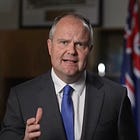Netanyahu Backs Trump’s 20-Point Gaza Peace Plan as Hamas Reviews Proposal
This piece is freely available to read. Become a paid subscriber today and help keep Mencari News financially afloat so that we can continue to pay our writers for their insight and expertise.
Today’s Article is brought to you by Empower your podcasting vision with a suite of creative solutions at your fingertips.
Israeli Prime Minister Benjamin Netanyahu agreed Monday to support a U.S.-sponsored peace proposal aimed at ending the war in Gaza, marking a potential breakthrough in the 18-month conflict that has killed tens of thousands and displaced millions.
President Donald Trump, standing alongside Netanyahu at the White House, said the two nations were “beyond very close” to reaching a deal. The 20-point plan calls for a ceasefire, the release of Israeli hostages held in Gaza, a staged Israeli withdrawal from the territory, Hamas disarmament and the establishment of a transitional government led by an international body.
“I support your plan to end the war in Gaza which achieves our war aims,” Netanyahu told Trump during a joint press conference. “It will bring back to Israel all our hostages, dismantle Hamas’s military capabilities and its political rule, and ensure that Gaza never again poses a threat to Israel.”
Trump thanked the Israeli leader for backing the proposal during Netanyahu’s fourth visit to the White House since Trump’s January inauguration.
Truth matters. Quality journalism costs.
Your subscription to Mencari directly funds the investigative reporting our democracy needs. For less than a coffee per week, you enable our journalists to uncover stories that powerful interests would rather keep hidden. There is no corporate influence involved. No compromises. Just honest journalism when we need it most.
Not ready to be paid subscribe, but appreciate the newsletter ? Grab us a beer or snag the exclusive ad spot at the top of next week's newsletter.
“I also want to thank Prime Minister Netanyahu for agreeing to the plan and for trusting that if we work together, we can bring an end to the death and destruction that we’ve seen for so many years, decades, even centuries, and begin a new chapter of security, peace and prosperity for the entire region,” Trump said.
Hamas has not officially received the written plan, according to Hamas official Mahmoud Mardawi, who spoke to Al Jazeera Mubasher TV shortly after the press conference. However, a source briefed on the negotiations said Qatar and Egypt shared the document with the militant group, which told mediators it would review the proposal “in good faith” before responding.
The announcement came as Israeli tanks pushed deeper into Gaza City on Monday in one of the largest offensives since the conflict began. The military operation continued despite the diplomatic developments in Washington.
Trump presented the peace framework to several Gulf states last week on the sidelines of the United Nations General Assembly in New York. The timing followed multiple countries, including Australia, formally recognizing Palestinian statehood during the UN gathering.
“I think it’s a deal that will get the hostages back, it’s going to be a deal that will end the war … it’s going to be peace,” Trump said.
The plan’s viability faces immediate questions from security analysts. Jennifer Parker, an expert associate at the Australian National University’s National Security College, said Netanyahu may lack support within his own government for key provisions.
“Although Netanyahu has agreed to it, does he really have the support of his government?” Parker said in an interview with ABC News Australia. “We’ve seen a lot of the right-wing elements of his government outline their conditions for any kind of peace plan, and they don’t seem to match up with this.”
Parker specifically cited proposed amnesty provisions for Hamas fighters as a potential deal-breaker for Netanyahu’s right-wing coalition partners.
“I think it’s highly unlikely that the right-wing elements of Netanyahu’s government are going to support it,” she said. “Of course, we’re all waiting to hear what Hamas says, but I think there is still going to be challenges within Israel itself in getting this through.”
International leaders quickly responded to the announcement. French President Emmanuel Macron welcomed the proposal on social media, calling for Israel to engage with the plan and demanding Hamas immediately release all hostages.
“I expect Israel to engage resolutely on this basis. Hamas has no choice but to immediately release all hostages and follow this plan,” Macron wrote on X. “These elements must pave the way for in-depth discussions with all relevant partners to build a lasting peace in the region, based on the two-state solution.”
British Prime Minister Keir Starmer released a statement calling the U.S.-led proposal “profoundly welcome.”
“We strongly support his efforts to end the fighting, release the hostages and ensure the provision of urgent humanitarian assistance for the people of Gaza,” Starmer said. “This is our top priority and should happen immediately.”
Starmer urged all parties to work with the Trump administration to finalize the agreement, adding that Hamas should “end the misery by laying down their arms and releasing all remaining hostages.”
The plan proposes a swap of hostages held by both Hamas and Israel, though specific details about the exchange ratios and timing remain unclear. The staged Israeli withdrawal from Gaza would occur in phases, according to the framework, though no timeline was provided during the press conference.
Parker noted the plan resembles previous proposals Netanyahu outlined months ago, raising questions about why Hamas would accept terms it has repeatedly rejected.
“What was tabled this morning does look a lot like the five-point plan that Netanyahu had outlined a number of months ago and subsequent deals that have been put forward,” Parker said. “Some of the conditions, so Hamas giving up arms, for example, are conditions that they have previously said they will never accept.”
She added that Hamas’s political leadership in Qatar appears to have diminished influence following Israeli strikes in the country earlier this month. Recent reports indicate a senior Hamas military commander has been attempting to rally forces for what some officials described as “one final battle.”
The proposed international governing body, which Trump suggested he would chair, drew particular scrutiny. The president said former British Prime Minister Tony Blair could join the so-called Board of Peace if he wished, though no formal structure has been announced.
Parker compared the proposal to United Nations-led transitional administrations established after conflicts in Kosovo and East Timor, noting those efforts benefited from UN oversight that provided a degree of impartiality.
“This doesn’t look to be UN-led, though, and that is a real concern,” Parker said. “Not knowing the construct of it, and certainly with Donald Trump saying he’s going to be, I guess, the provisional chair, for want of a better word, of this Board of Peace, there will be a strong perception, I suspect, from Palestinians in general that this is a very biased board that doesn’t represent their equities and their intentions.”
She added that successful transitional administrations require perceived neutrality, which may prove difficult given U.S. support for Israel throughout the conflict.
Trump has repeatedly stated his desire to end multiple international conflicts since returning to office. During the UN General Assembly last week, he mentioned seven wars he hoped to resolve, fueling speculation among analysts that Nobel Prize aspirations may be driving his diplomatic push.
“We know that President Trump has an aspiration to become a Nobel laureate and win a Nobel Peace Prize,” Parker said. “So, I think that you’re seeing Netanyahu want to play up to this.”
She noted that increasing international pressure on Israel and calls for the U.S. to halt arms supplies have created additional incentives for Netanyahu to demonstrate diplomatic flexibility.
“There’s also increasing international pressure on the US to stop supplying arms to Israel,” Parker said. “So, Netanyahu knows that he needs the support of Trump for whatever the next phases are.”
The White House released the 20-point plan following the press conference, though Hamas officials said they needed time to review the document with mediators before issuing a formal response. Egyptian and Qatari officials, who have served as intermediaries throughout previous negotiation attempts, declined immediate comment.
The plan’s release comes at a critical moment in the conflict. Humanitarian organizations have warned of worsening conditions in Gaza, where infrastructure has been devastated by months of fighting. The proposed ceasefire would allow for increased humanitarian aid delivery, though implementation details remain unspecified.
Netanyahu’s agreement to the proposal represents a shift in rhetoric from the Israeli government, which has maintained throughout the conflict that Hamas must be completely eliminated as a military and political force. The plan’s provision for Hamas disarmament stops short of that goal, potentially creating friction with hardline members of Netanyahu’s coalition.
The Israeli Prime Minister shook hands with Trump outside the White House after arriving by limousine Monday afternoon. The meeting lasted several hours before the leaders emerged for the joint press conference, where they took no questions from reporters.
During his 2024 presidential campaign, Trump repeatedly vowed to quickly end the Gaza conflict. Since taking office in January, he has made similar claims about progress toward a peace deal, though previous announcements failed to produce concrete results.
Whether this latest proposal will succeed remains uncertain. Hamas’s response, expected in the coming days, will provide the first clear indication of whether negotiations can move forward. Netanyahu’s ability to maintain coalition support for the plan’s provisions will determine whether Israel can implement its commitments.
The conflict has drawn international condemnation and protests worldwide, with particular focus on civilian casualties in Gaza. The proposed peace plan represents the most detailed framework yet for ending the fighting, though its ultimate success depends on acceptance and implementation by parties that have shown little willingness to compromise throughout the war.
Sustaining Mencari Requires Your Support
Independent journalism costs money. Help us continue delivering in-depth investigations and unfiltered commentary on the world's real stories. Your financial contribution enables thorough investigative work and thoughtful analysis, all supported by a dedicated community committed to accuracy and transparency.
Subscribe today to unlock our full archive of investigative reporting and fearless analysis. Subscribing to independent media outlets represents more than just information consumption—it embodies a commitment to factual reporting.
As well as knowing you’re keeping Mencari (Australia) alive, you’ll also get:
Get breaking news AS IT HAPPENS - Gain instant access to our real-time coverage and analysis when major stories break, keeping you ahead of the curve
Unlock our COMPLETE content library - Enjoy unlimited access to every newsletter, podcast episode, and exclusive archive—all seamlessly available in your favorite podcast apps.
Join the conversation that matters - Be part of our vibrant community with full commenting privileges on all content, directly supporting The Evening Post (Australia)
Catch up on some of Mencari’s recent stories:

Australia Reports $10B Deficit as Telecom Crisis, Political Controversies Dominate National Agenda
It only takes a minute to help us investigate fearlessly and expose lies and wrongdoing to hold power accountable. Thanks!







